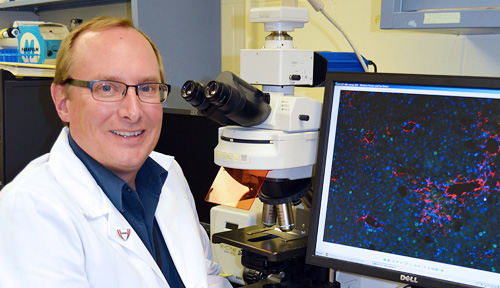When diabetes claims a hand, finger, leg or toe, researcher Robert Bennett, Ph.D., knows it doesn’t have to be that way.
As associate professor of diabetes, endocrinology and metabolism at UNMC and a research chemist at the Omaha VA Medical Center, Dr. Bennett wants to help clinicians save lives and limbs.
He hopes relaxin, a naturally occurring hormone that helps prepare a woman’s body for pregnancy, holds the key to new therapies for liver, kidney and diabetes-related vascular problems.
Relaxin, which allows a woman’s body to stretch, and, in men enhances activity of sperm, has been shown to prevent and reduce fibrogenesis, or scarring on wounds and organs.
A member of the insulin family of hormones, relaxin works to keep collagen, a connective tissue protein that covers and protects wounds, from accumulating. Relaxin also relaxes blood vessels to reduce stress on the heart and kidneys and enhances the growth of new blood vessels.
Diabetes causes blood vessels of the foot and leg to narrow and harden. Poor circulation can make it difficult for extremities to fight infection and heal. More than 60 percent of nontraumatic lower-limb amputations occur in people with diabetes.
How relaxin helps blood vessels improve circulation is the focus of Dr. Bennett’s research into the beneficial effects of this polypeptide hormone. One of only 125 people in the world to study relaxin’s role on tissues, Dr. Bennett has exhaustively studied how it affects the liver.
Constant injury to the liver by alcohol, hepatitis and excessive use of acetaminophen cause the organ to produce an excess of collagen, which builds, hardens and turns into fibrosis and later cirrhosis of the liver. Every year, liver fibrosis and cirrhosis affects 900,000 people and causes 36,000 deaths in the United States.
Progressive scarring by fibrosis is a leading cause of organ failure worldwide. It causes loss of organ function when normal tissue is replaced with excess connective tissue. No therapy has been effective in fibrotic disease, which is considered an irreversible process and is still treated by anti-inflammatory and immunosuppressive drugs.
Scientists have found that relaxin clears scars by decreasing the amount of collagen, which allows liver function to improve so it can repair itself. Relaxin’s effects on the circulation also contribute to its antifibrotic actions. It’s been so effective against scarring that it is now in clinical trials for liver and kidney disease, lung fibrosis, acute heart failure and preeclampsia.
Although the relaxin gene has been identified, Dr. Bennett wants to pinpoint which cells actually produce the hormone. “My goal is to develop a technique that allows me to switch production on and off at will.”
He works with a mouse model in which the relaxin receptor does not work. So, while the hormone is produced, it cannot be activated anywhere in the body.
“I want to see what happens when relaxin is unable to do its job,” Dr. Bennett said.
He has studied the role of the relaxin receptor in hepatic stellate cells, the major cell involved in liver fibrosis. When the stellate cell is activated, it secretes collagen and factors that contribute to vasoconstriction which can lead to cirrhosis.
“After the mice developed fibrosis, I gave them relaxin and found that it cleared the scar and allowed the liver to repair itself,” he said.
Dr. Bennett is excited that a new mouse model that does not have the relaxin gene has been developed at the Knockout Mouse Project Consortium in California. Once he obtains some of these mice, he may be able to engineer a mouse model tailored more closely to his research.
With the risk for stroke two- to four-times higher among people with diabetes, the implications of this research to vascular-related diseases — heart disease, stroke and high blood pressure — are profound, he said.
“Relaxin has emerged as a natural suppressor of age-related fibrosis in many tissues, which include the skin, lung, kidney and heart. New targets and mechanisms for relaxin’s actions will provide unprecedented advances in the field.”
But for now, Dr. Bennett would be satisfied if his work helps to save at least one of the nearly 66,000 limbs claimed by diabetes every year.
